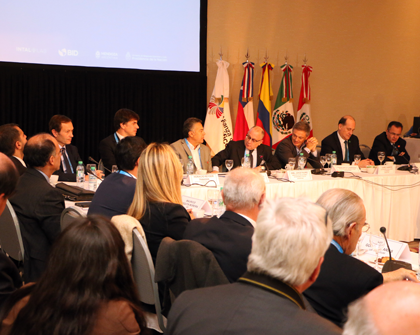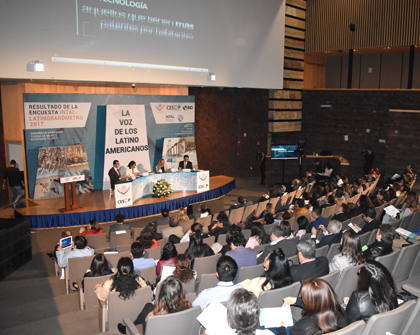A high-level dialogue entitled MERCOSUR–Pacific Alliance: A Positive Integration Agenda took place on July 19, 2017, in the city of Mendoza in the Republic of Argentina, as part of the 50th MERCOSUR Summit. At the request of and in partnership with the Republic of Argentina’s Ministry of Foreign Relations and Worship, the Institute for the Integration of Latin America and the Caribbean (INTAL), part of the Integration and Trade Sector at the Inter-American Development Bank (IDB), brought together experts from the public and private sectors and academia to identify focal points and draw up guidelines for a joint agenda to fast-track rapprochement between the two blocs.[1]
There is a shared belief among experts that the MERCOSUR and the Pacific Alliance (PA) have an opportunity for moving toward a joint work program that is both realistic and pragmatic, based on the idea of bringing existing national objectives in line with possible regional goals. This would lead to positive feedback between the two blocs and would strengthen a broader regional space, in a context in which isolated players have less chance of improving their global integration status than those who find ways of working together.
Taking advantage of this opportunity is a rational response to both the uncertainty that currently characterizes global economic relations and to the long list of unfinished business in the history of regional integration.
This biregional agenda needs to be realistic, pragmatic, and strategically focused from the outset, and should be made up of goals that are motivating, inspiring, and extremely relevant. This aims to build on tangible, positive results in operational areas where concrete outcomes can be achieved. Increasing integration between the two blocs should contribute to achieving national targets that have already been agreed upon.
There are three key factors in the rapprochement process between the PA and the MERCOSUR: opting for simplicity; articulating public and private initiatives; and generating innovative options that sustain the dynamic of the link and strengthen and expand its results.
The seminar identified two main groups of projects, one of which is oriented toward trade facilitation and the other to strengthening regional value chains. Although these two groups have specific features, they are clearly not entirely separate. For example, taking the much-needed, long-term perfecting of instruments on rules of origin to the regional level would require improvements to data handling and the traceability of operations and operators within the sphere of trade facilitation. Likewise, trade facilitation initiatives cannot be separated from the broader trade policy framework.
Those at the event also put forward ideas on issues such as cooperation around technological innovation policies, entrepreneurship, and small and medium-sized companies, among others. Areas for developing creativity as part of a dynamic agenda.
Evolution
A meeting of the MERCOSUR and PA ministers of foreign relations and ministers responsible for foreign trade and production took place on April 7, 2017, in Buenos Aires and confirmed the joint work areas put forward by the two blocs in 2016. In addition, the PA High-Level Group (HLG) and the MERCOSUR Common Market Group (GMC) were instructed to meet periodically to make progress on the issues identified in the road map.
In July 2017, during the aforementioned summit in Mendoza, the MERCOSUR member countries signed an investment promotion and facilitation agreement based on the protocol they had agreed on in April.[2]
In a similar direction, authorities from the two blocs met on August 4, 2017, at the ALADI headquarters in Montevideo, Uruguay, where they looked at issues relating to the accumulation of origin, productive chains, customs procedures, promotion events and spaces of mutual interest, barriers to trade, and the facilitation of trade in services. For example, in relation to accumulation of origin and productive chains, they agreed to hold meetings between experts with the aim of exchanging information and experience from each bloc. Regarding trade facilitation, they agreed to promote rapprochement to implement initiatives that aim to facilitate, streamline, and fast-track customs procedures.[3]
Key Factors in a Positive, Innovative Agenda: From Customs to Regional Value Chains
The task ahead is not an easy one. In principle, the two blocs need to simplify the complex web of relations between the countries that make them up and bridge the existing gaps in relations so as to move toward establishing a free trade area. To achieve this, they need to find stable areas of equilibrium which are both flexible and predictable, which may prove to be a difficult undertaking.
A more realistic vision for this road map would be to move toward a series of rapprochements focusing on areas in which biregional cooperation could be productive and could counteract the uncertainty that currently characterizes the international arena.
Both blocs have assets that could lead to a cross-pollination between them. For example, ALADI is a shared asset that could function as a space for negotiations and monitoring and could facilitate business relations and be used to further an agenda for rapprochement.
A general overview of the next steps that need to be taken toward convergence between the two blocs would suggest that they avoid getting involved in excessively complex and unnecessary initiatives and instead focus their work on promoting a simple, concrete, actionable agenda as pragmatically as possible. The seminar made significant contributions to these aims.
In particular, eight proposals emerged from the high-level dialogue with the aim of moving toward trade facilitation and strengthening regional value chains between the two blocs, which are summarized in the following diagram.
The following government authorities, officials from international organizations, academics, and members of business organizations all took part in the seminar:
- Ambassador Jorge Faurie. Minister of Foreign Relations of the Republic of Argentina Ver presentación
- Francisco Cabrera. Minister of Production of the Republic of Argentina Ver presentación
- Alfredo Cornejo. Governor of Mendoza Province, Argentina
- Horacio Reyser Travers. Secretary of International Economic Relations, Ministry of Foreign Affairs and Worship, Argentina Ver presentación
- Paulo Estivallet de Mesquita. Undersecretary-General for Latin America and the Caribbean, Ministry of Foreign Relations, Brazil Ver presentación
- Abrão Miguel Árabe Neto. Secretary for Foreign Trade at the Ministry of Industry, Foreign Trade, and Services (MDIC), Brazil Ver presentación
- Carlos Carvallo Spalding. Member of the Board of Directors at the Central Bank of Paraguay Ver presentación
- Juan Angel Delgadillo. Director-General for Economic Policy, Ministry of Foreign Relations, Paraguay Ver presentación
- Gabriel Bellón. Director-General for Integration Affairs and the MERCOSUR, Ministry of Foreign Relations, Uruguay Ver presentación
- Juan Alfonso Labraga Brea. Director of the Trade Policy Consultancy, Ministry of the Economy and Finances, Uruguay Ver presentación
- Shunko Rojas. Undersecretary of Foreign Trade, Trade Secretariat, Ministry of Production, Argentina Ver presentación
- Alejandro de la Peña Navarrete. Mexico’s Representative at the Latin American Integration Association (ALADI) Ver presentación
- Luis Felipe Quesada Incháustegui. Director-General for Economic Affairs, Ministry of Foreign Relations, Peru Ver presentación
- Abdul Fatat. Director of Economic Integration, Ministry of Trade, Industry, and Tourism, Colombia Ver presentación
- Luis Fernando Londoño Capurro. Colombia’s Ambassador to Argentina Ver presentación
- Karina Cánepa Espada. Head of the South America and Regional Integration Organizations Department, DIRECON, Chile Ver presentación
- Antoni Estevadeordal. Manager of the IDB’s Integration and Trade Sector Ver presentación
- Gustavo Beliz. Director, INTAL/IDB Ver presentación
- Félix Peña. Director of the ICBC Foundation, Argentina Ver presentación
- Roberto Bouzas. Academic Director of the Master’s in International Politics and Economics, University of San Andrés (UDESA), Argentina Ver presentación
- Rubens Barbosa. President of the Upper Council of Foreign Trade of the Federation of Industries of the State of São Paulo, Brazil Ver presentación
- Renato Baumann. Secretary for International Affairs, Ministry of Planning, Development, and Management, Brazil Ver presentación
- Álvaro Ons. Secretary of Productive Transformation and Competitiveness, Uruguay Ver presentación
- Alan Fairlie Reinoso. Catholic University of Peru Ver presentación
- Raúl Eduardo Sáez. CIEPLAN, Chile Ver presentación
- Rafael Cornejo. International Trade Consultant Ver presentación
- Lisandro Nieri. Ministry of Economics and Finances of Mendoza, Argentina Ver presentación
- Ricardo Rozemberg. Researcher, Centro Ideas, Argentina Ver presentación
- Ricardo Rodríguez Silvero. Director of the RS&A consultancy firm, Paraguay Ver presentación
- Diego Yarza. National Chamber of Trade in Services, Uruguay Ver presentación
- Franchesca Garay. Specialist, National Society of Industries, Peru Ver presentación
- Rodrigo Arim Ihlenfeld. Dean of the School of Economic Sciences and Administration, University of the Republic, Uruguay Ver presentación
- Diego Coatz. Executive Director and Chief Economist at the UIA, Argentina Ver presentación
- Mauricio Mesquita Moreira. Chief Economist, Integration and Trade Sector, IDB Ver presentación
- Ana Paula Repezza. Director of Productive Integration and Economic Development, Office of the President, Brazil
- César Llona. Undersecretary of Development at the Free Trade Department, ALADI Ver presentación
- Enrique Mantilla. President of the Argentine Chamber of Exporters (CERA) Ver presentación
- Marcela Ruth Espinoza Nissim. Director of Borders, Ministry of Foreign Relations, Chile Ver presentación
- Nicole Morani Brown. Head of Public–Private Dialogue and Communication at VUCEA, Ministry of Production, Argentina Ver presentación
- Ronnie Pimentel.Trade Facilitation Specialist, National Confederation of Industries (CNI), Brazil Ver presentación
- Manuel José Prieto. Manager of International Affairs and Foreign Trade at SOFOFA, Chile Ver presentación
- Luis González Arias. Chief of Staff at the Industrial Union of Paraguay Ver presentación
- Mario Castillo, Head of the Innovation and New Technologies Unit, ECLAC Ver presentación
- Mariano Mayer. Secretary of Entrepreneurs and SMEs, Ministry of Production, Argentina Ver presentación
- Gonzalo Brahm. Executive Director of ASELA, Consultant for the PA Business Council, Chile Ver presentación
- Giovanni Andrés Gómez Camelo. ANALDEX (Colombia)Ver presentación
- Rafael Nava y Uribe. President of the International Department for South America at COMCE, Mexico Ver presentación
- Mario Mongilardi. President of the Lima Chamber of Commerce, Peru Ver presentación
- Andrés Rugeles. Director and CAF Representative in Argentina Ver presentación
[1] The proposals reviewed in this report only reflect the opinions of the individuals who took part and not those of the institutions that organized the event.
[2] It was decided at the same meeting that the foundations for a future agreement on government procurement should be established.
[3] They also agreed that: countries will exchange information on promotion events and spaces to promote business meetings and develop trade promotion events; they will also look at mechanisms for exchanging information on barriers to trade; and experts from each bloc will identify services-specific work areas.






